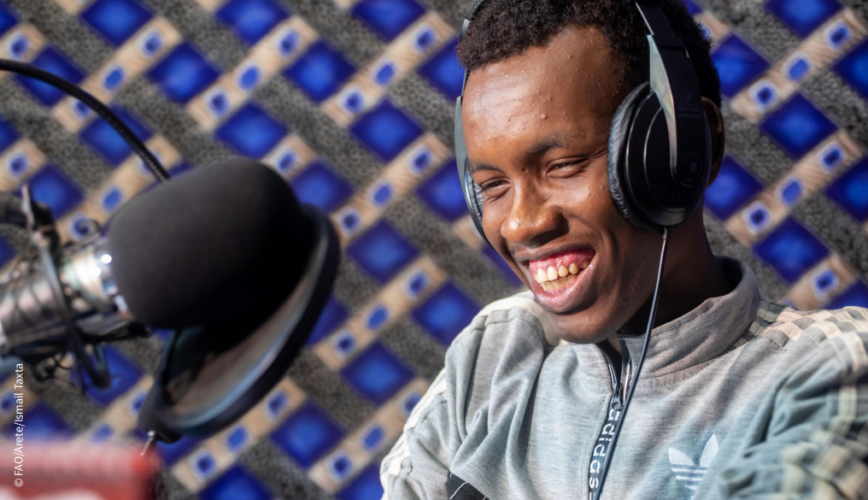Overcoming COVID-19 restrictions through adaptive measures that facilitate access to agricultural and nutrition knowledge
Over the years, Somalia experienced conflict and fragility that resulted in severe poverty and vulnerability, displacement, poor economic capacity, and food and nutrition insecurity. Most of the country’s population is in rural areas, and they rely on agriculture as the primary source of livelihood and exports. In 2020, up to 1.3 million people in Somalia faced high food insecurity which resulted in climatic shocks that have been recurrent since 2016, including six seasons of drought conditions and two seasons of severe flooding that led to the loss of crops, agricultural labour, and income, as well as atypical livestock migration.
To respond to this crisis, the Food and Agriculture Organization (FAO) of the United Nations promoted activities that enhance food security and resilience through integrated cash and livelihood assistance for crops, livestock and fisheries; and tackling underlying causes of malnutrition through nutrition awareness-raising, food hygiene, conservation and storage.
One of the activities promoted was a distance learning initiative through radio, which was launched in 2020 by FAO to respond to threats posed by the COVID-19 pandemic, supporting cash activities and replacing face-to-face beneficiary training in Puntland, Galmudug and Southern regions of Somalia (Hirshabelle, South West State and Banadir).
Through this initiative, FAO sought to continue enhancing rural communities’ capacities to mitigate shocks, especially those compounded by the COVID-19 crisis, and disseminate context-specific behaviour change messages on nutrition and healthy diets. In 2021, the scope of the training was expanded to include long-term agriculture development programmes and social protection activities through village savings and loan associations.
A publication on the distance learning initiative has been released. It showcases the results of the activity, highlighting how distance learning contributes to increasing the resilience of livelihoods in Somalia, the approach used, the impact, testimonies, the sustainability, replicability and upscaling and the key learning.
Through 2021 and 2022, the initiative focused on Climate-Smart Agriculture, Nutrition, Outreach Project II (Agriculture+ Value chain), Financial Literacy on VSLA and others through various radio stations in different parts of Somalia. In 2021 and 2022, there was a 142.11% increase in broadcasting and listening. In May 2022, 110 magazines, 48 Public Service Announcements and 21 Voice Messages were put out across the focus topics. These data show the intense activities and progress carried out since implementing the initiative.
An impact of this initiative is the capacity development appreciation by the audience, which resulted in them requesting that the radio educational features continue as this has contributed to positively changing lives.
This initiative shows that communication is essential for agricultural and rural development. Making knowledge and information available to the most vulnerable population segment while involving them in the vital decision and collective action plays a fundamental role in emergencies and protracted crises.
To access the full report on the impacts and testimonies of the “Distance learning initiative”, click the link below.
Distance learning via radio for rural communities in Somalia


Comments are closed, but trackbacks and pingbacks are open.